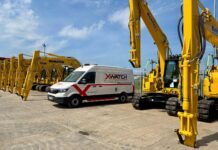By Benjamin Rothwell, business development manager at Bunkabin
THE Covid-19 pandemic has created major challenges for the entire construction sector. Not only have supply chains and project planning been significantly disrupted by the nationwide lockdown, but the need for continued safety precautions to prevent the spread of the virus means that a return to business as usual remains a distant prospect.
Construction firms can ill afford any further inactivity, which is why businesses in Scotland and across the UK are putting new measures in place to ensure that staff are able to return to work without putting their health – or indeed, the public’s health – at risk.
However, this involves compromises, which are making it hard for builders to get back to full productivity in a way that’s safe.
As such, site managers are looking for new ways of working to help them strike the right balance between hygiene and efficiency in the current Covid-19 era – and portable on-site accommodation could be part of that solution.
What challenges can portable accommodation solve?
All employers across the UK face broadly the same safety responsibilities as they return to work after lockdown: namely, to prevent the spread of coronavirus among workers and site visitors by enforcing social distancing standards, and to adopt rigorous hygiene and disinfection practices to prevent the spread of the coronavirus.
However, construction work creates specific challenges for Covid-19 prevention due to the nature of the activity. With no option to carry out this physical work remotely, labourers must often work in a tight-knit group, mingling in close proximity using shared tools and equipment; as such, social distancing is often harder to implement, creating a need for additional hygiene precautions and protective gear.
Adding to this is the fact that construction workers will often need to travel to and from the site on a daily basis, often over long distances due to the remote nature of many construction sites. This increases the risk of transmission between staff and members of the public, and makes it difficult for those in charge of on-site safety to control all of the variables that occur when workers are regularly entering and leaving the site.
How are these benefits realised?
On-site accommodation is a solution that many construction firms utilise under more typical circumstances to keep a group of workers together, avoiding the need for lengthy commutes when working in secluded locations, and improving the overall productivity of the project. At a time when Covid-19 is a prevailing factor, the value of these advantages becomes even more pronounced.
By utilising portable accommodation options, construction firms can manage the risk of transmission among their workforce much more effectively. This method allows them to essentially treat fixed groups of workers as on-site ‘households’, allowing them to monitor their health on a group-by-group basis, and to set guidelines on how often these groups should mix.
Because staff will not need to commute to and from work while being housed on-site, this makes it much easier for managers to operate a relatively controlled environment. Workers can be helped to self-isolate if they experience symptoms, and all of the associated risks can be handled internally without needing to worry about transmissions to and from the general public.
Additionally, modern portable cabins are designed in such a way as to make this easier to accomplish. These units are created to be spacious, comfortable and easy to clean and disinfect, whether you are dealing with a ensuite single-person site sleeper cabins, a dining unit or a shower block; they can also be hired and transported to and from the site on an ad hoc basis, making it easy to scale the accommodation facilities up or down at short notice, according to the needs of the project.
At a time when Covid-19 is putting traditional business models and ways of working at risk, there is a real need for construction firms to adopt new solutions and adapt to the situation at hand.
By making intelligent use of portable accommodation, they can meet their public health obligations and safeguard the wellbeing of their staff, while also making important progress on their path back to growth.











